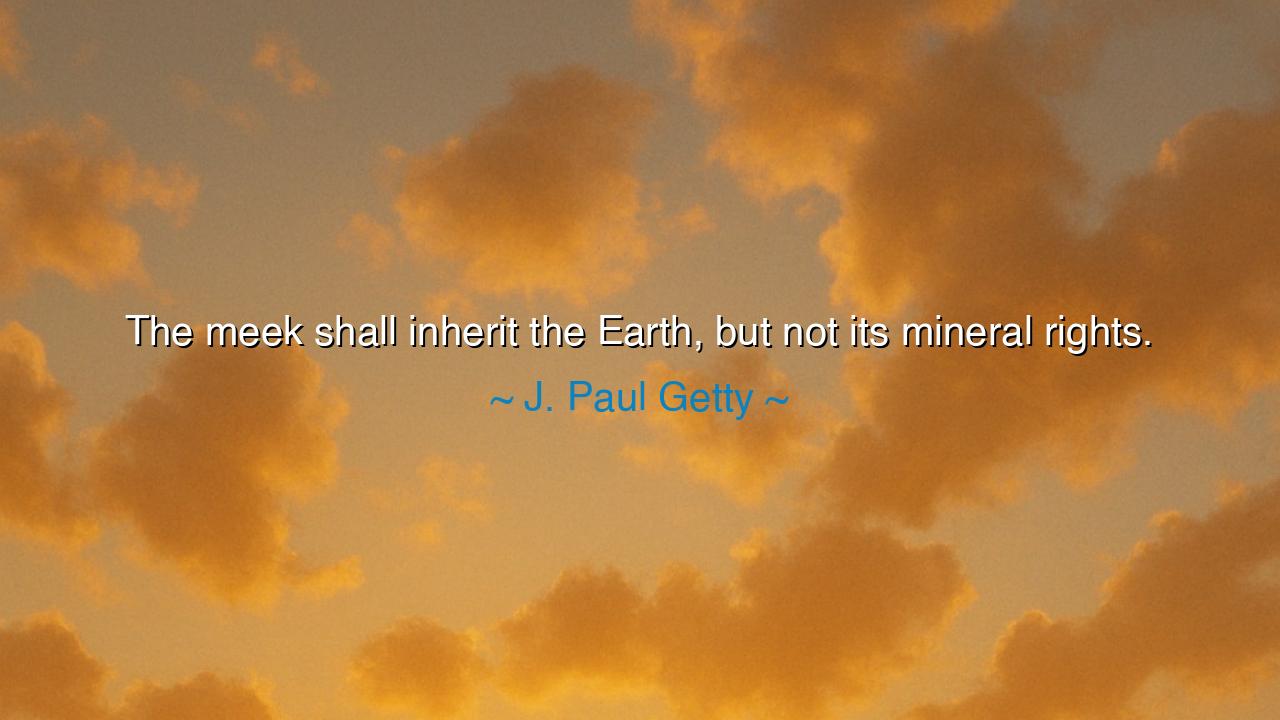
The meek shall inherit the Earth, but not its mineral rights.






Host: The room was calm, the soft light of the evening casting a gentle glow over the space. Jeeny sat at the table, a cup of tea in hand, her fingers lightly tracing the rim as she reflected on the words. Jack stood near the window, arms crossed, gazing out at the peaceful city below. After a brief moment of silence, Jack spoke, his voice gentle, yet with a hint of humor.
Jack: (his voice calm) "The meek shall inherit the Earth, but not its mineral rights."
Jeeny: (looking up, her voice soft, but thoughtful) "That’s such a clever twist on a well-known saying, isn’t it? The idea that while humility and gentleness may win us moral or spiritual rewards, the material wealth of the world, like its resources, isn’t easily accessible for the meek. There’s a deeper message about how the world operates and what it values."
Jack: (nodding slowly, his tone reflective) "Exactly. It’s a reminder that while goodness and humility might lead to spiritual fulfillment, material wealth often operates by different rules. The world, in many ways, is driven by power, money, and resources, and those who control them are usually the ones who hold the real influence. The meek may inherit moral rewards, but they’re often left out of the material benefits."
Jeeny: (smiling softly, her voice calm, almost philosophical) "It’s an interesting critique of how society values certain traits over others. The meek, the humble, are often seen as virtuous, yet in a capitalist world, virtue doesn’t always equate to power or material wealth. There’s a clear distinction between spiritual inheritance and the control over resources."
Jack: (his voice gentler, almost with a sense of awareness) "Yes, and it brings to light the tension between values and reality. In an ideal world, perhaps the meek would inherit the Earth in every sense, but in reality, material wealth often comes with a different set of rules. The people who control the land, the resources, and the industries are often those who have power, influence, and, more often than not, money."
Jeeny: (nodding thoughtfully, her voice reassuring) "Exactly. And I think that’s why the quote is so impactful. It’s a reminder of the inequality that exists between moral or spiritual inheritance and the material world. While the meek may inherit peace or spiritual rewards, it’s the powerful who control the tangible assets of the world."
Jack: (smiling softly, his voice calm) "And it’s a reminder that, while we might value virtues like humility, kindness, and integrity, they don’t always guarantee access to the material rewards that drive society. The world often rewards different things — things like ambition, ruthlessness, and power."
Jeeny: (smiling warmly, her voice gentle) "Exactly. And yet, I think the deeper message of the quote is that moral and spiritual inheritance is just as important — if not more — than material wealth. The meek may not get the mineral rights, but they may gain something far more valuable, like peace of mind, contentment, and a life well-lived."
Host: The room seemed to settle into a deeper understanding. Jack and Jeeny had uncovered a profound truth about wealth, power, and virtue: that while the material rewards of the world are often controlled by the powerful, the moral and spiritual inheritance of the meek is something that cannot be measured by money. The world outside continued its rhythm, but inside, there was a shared realization that what we value most often transcends material wealth and is found in the values we hold and the lives we lead.






AAdministratorAdministrator
Welcome, honored guests. Please leave a comment, we will respond soon